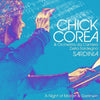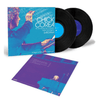



Chick Corea & Orchestra da Camera Della Sardegna - Sardinia : A Night of Mozart & Gershwin (2LP)
Wolfgang Amadeus Mozart - Piano Concerto No. 24 In C Minor, K.491 (A1-2, B1-2),
George Gershwin - Someone To Watch Over Me & Rhapsody In Blue (C1-2, D1)
Piano - Chick Corea [click here to see more vinyl featuring Chick Corea]
Orchestra da Camera Della Sardegna
Conductor - Simone Pittau
2 LP, standard sleeve
Original analog Master tape : YES
Heavy Press : 180g
Record color : black
Speed : 33 RPM
Size : 12'’
Stereo
Live
Record Press : unspecifed
Label : Candid
Original Label : Candid
Recorded at the Annual Cultural Festival in Mogoro, Sardinia, on November 29, 2018
Engineered by Alberto Erre
Mixed By Bernie Kirsh
Produced by Bernie Kirsh, Chick Corea
Executive Producer - Jordin Jaz Pinkus
Mastered by Bernie Grundman
Photography by Jordin Jaz Pinkus
Liner Note by Robin D.G. Kelly
Originally released in September 2023
Track :
Side A: Mozart - Piano Concerto No. 24 In C Minor
- Intro
- Allegro
Side B: Mozart - Piano Concerto No. 24 In C Minor
- Larghetto
- Allegretto
Side C:
- Intro
- Someone To Watch Over Me
Side D:
- Rhapsody In Blue
Reviews :
"Sardinia opens with a performance of Mozart’s Piano Concerto No.24 in C Minor K491 in full – 'Allegro', 'Larghetto; and 'Allegretto'. It is preceded by what the liner notes call a ‘Mozart Intro,’ performed a cappella by Corea. It is not particularly Motzartian in conception or harmonically related to the late 18th Century (containing rootless extended harmonies courtesy late 1960s Bill Evans, McCoy Tyner and Herbie Hancock).
The reason Corea chose to preface his concert performances in this way was explained to me in interview in January 2006: “I always found it uncomfortable playing a piano concerto, where the orchestra begins and they play the tutti and then the pianist comes in. I always found it hard to just walk onstage and just begin like that, so I began developing playing the piano first before the concerto begins, so I improvise what then became an introduction to the concerto, which included a cue that I would give to the orchestra to bring them in.”
The Orchestra da Camera Della Sardegna perform Mozart as written, while Corea, who in another life could equally have been a major concert pianist, personalises his performance in a fascinating way, sometimes counterpointing, doubling or harmonising the orchestral tuttis, embellishing his solo lines and improvising the cadenzas, all touches Mozart himself is believed to have done.
Otherwise Corea sticks to the script but can’t resist inverting the two bar melodic series of answers to the questions posed by the ensemble early on during the 'Allegro tutti' passage. When Corea first improvised a cadenza during a Mozart piano concerto (there are 27 of them) in the late 1990s, he told no-one in advance, and caused a sensation – conductor and orchestra loved it, critics were perplexed and the audience was largely unaware of what had happed. This mischievous impulse delighted Corea and became part and parcel of his classical performances, and in the piano cadenza in Gershwin’s 'Rhapsody in Blue', comprising the second part of this album (it is prefaced by Corea’s ‘Gershwin Intro’ and ‘Someone to Watch Over Me’), he really goes to town, as well as taking improvisational liberties during his solo passages – well, Gershwin was inspired by jazz when he wrote it." Jazzwise



